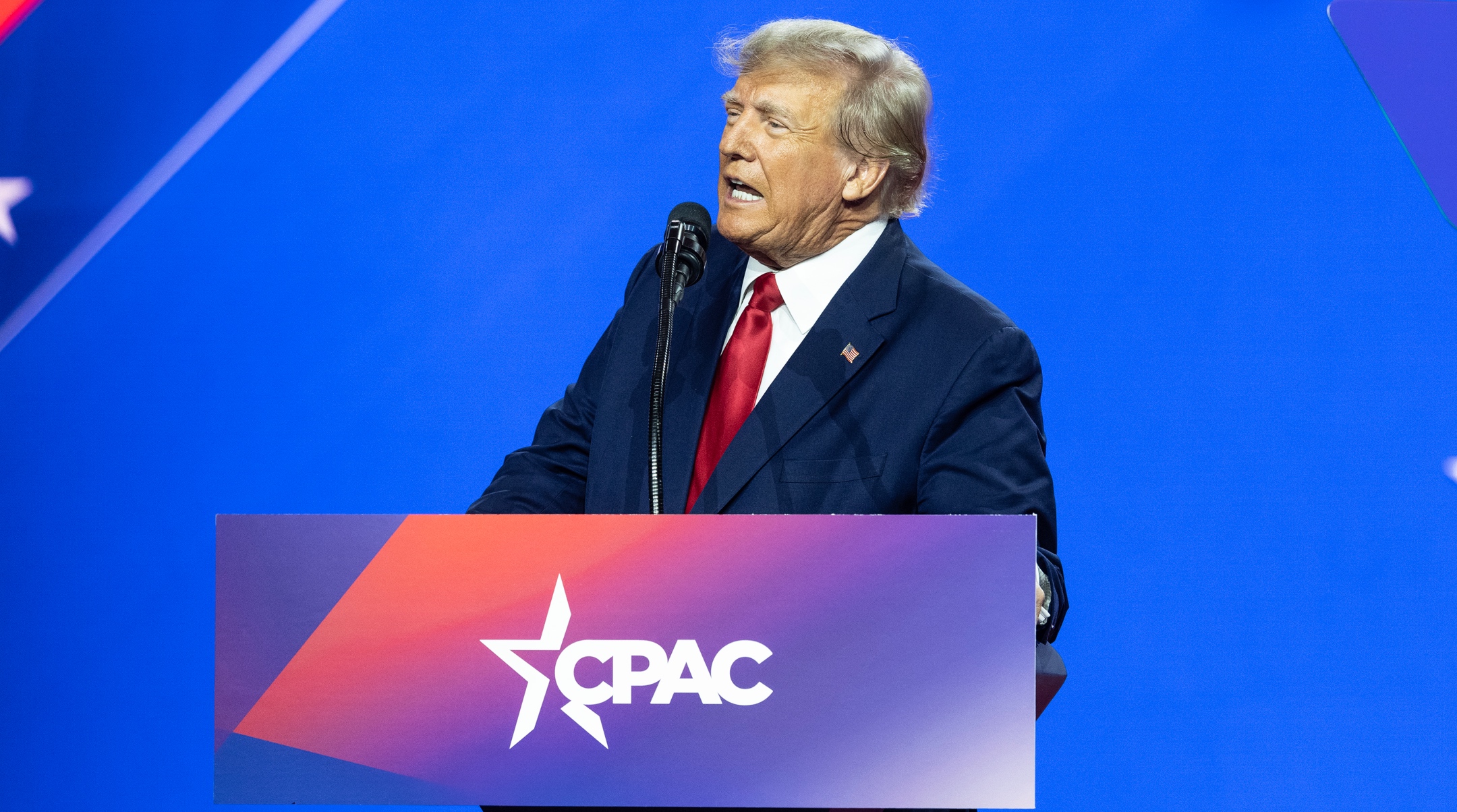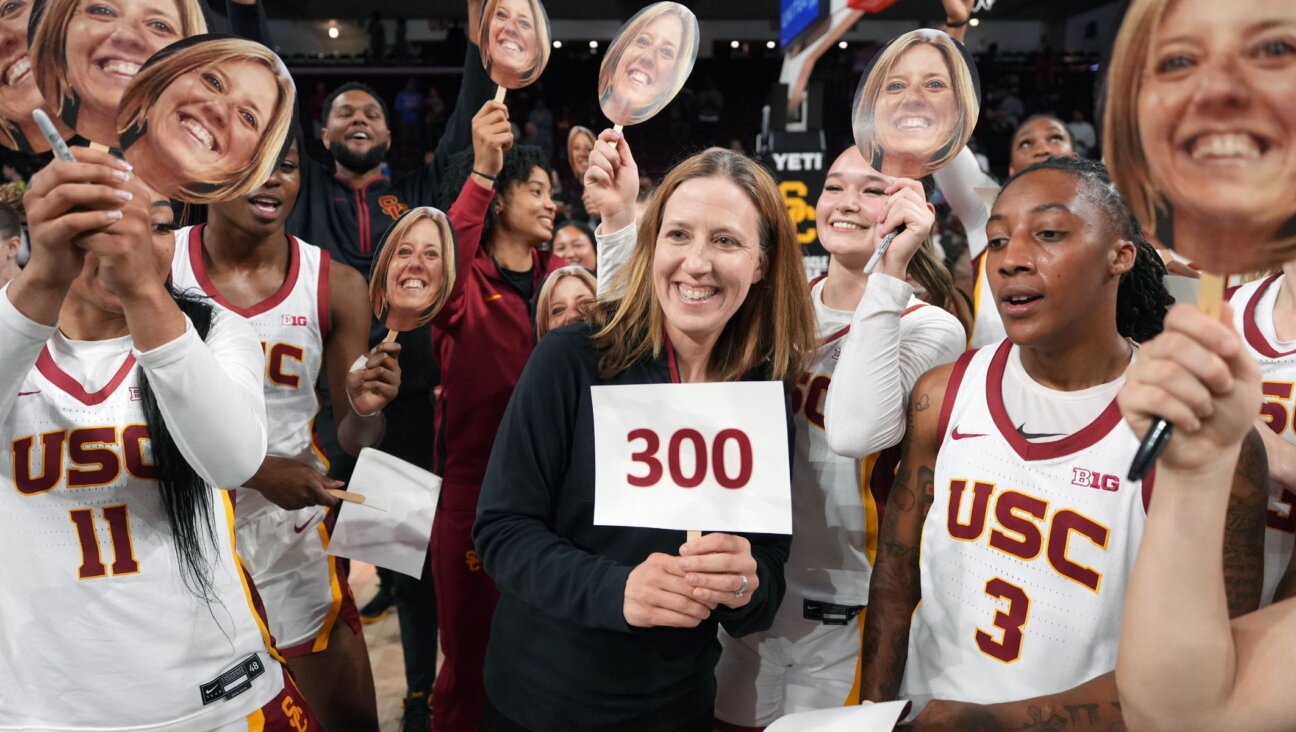‘Reasonable’ CNN viewers couldn’t mistake Trump for Hitler, judge rules
Dismissing a defamation suit, the judge ruled that the network’s claims that Trump was spreading ‘The Big Lie’ would not lead viewers to think he advocates the genocide of Jews

Donald J. Trump, 45th President of the United States speaks at the CPAC conference in Washington, D.C., on March 4. Photo by Lev Radin/Pacific Press/LightRocket via Getty Images
(JTA) – A federal judge has dismissed Donald Trump’s defamation lawsuit against CNN, ruling that the network’s use of the phrase “The Big Lie” to describe the former president’s 2020 election claims could not lead a reasonable viewer to believe that Trump is comparable to Adolf Hitler.
U.S. District Judge Raag Singhal issued his decision late Friday, noting in his opinion that CNN’s rhetoric “does not give rise to a plausible inference that Trump advocates the persecution and genocide of Jews or any other group of people.”
Singhal added, “No reasonable viewer could (or should) plausibly make that reference.”
Trump’s legal team sued the news network last fall for $475 million, claiming that it had defamed Trump when its on-air pundits repeatedly compared his false election fraud claims to the way Hitler used propaganda in his own rise to power. Trump, who is the frontrunner for the 2024 Republican presidential nomination, has repeatedly claimed, without evidence, that the 2020 election was stolen from him.
Trump’s lawyers zeroed in on one claim in particular: CNN personalities’ use of the phrase “Big Lie.” The term is commonly understood to refer to Nazi propaganda tactics, in particular propaganda minister Joseph Goebbels’ purported strategy of repeating big lies so often that people would start to believe them, though there is no evidence Goebbels himself ever defined the term this way.
“The ‘Big Lie’ was used by Hitler to incite hatred of the Jews and to convince people to ostracize Jewish people,” Trump’s lawyers stated in their lawsuit. “It was an entire propaganda campaign to justify Jewish persecution and genocide. The phrase is not taken lightly and is not bandied about blithely. CNN anchors and commentators understand this. They have not used it against other political leaders and previously criticized political analogies to Nazi Germany and to Hitler.”
Singhal, who was appointed by Trump, rejected the argument.
“Being ‘Hitler-like’ is not a verifiable statement of fact that would support a defamation claim,” he wrote in his dismissal. “CNN’s statements, while repugnant, were not, as a matter of law, defamatory.”
The term “big lie” has come to be deployed frequently in politics, from all parts of the ideological spectrum, including by those who aim to remain nonpartisan. In 2019, for example, an Alabama Republican in Congress charged Democrats with perpetrating a “big lie” accusing Trump of collusion with Russia. The Anti-Defamation League, meanwhile, has also used the term to refer to false claims about the 2020 election results and their consequences.
This article originally appeared on JTA.org.
A message from our CEO & publisher Rachel Fishman Feddersen

I hope you appreciated this article. Before you go, I’d like to ask you to please support the Forward’s award-winning, nonprofit journalism during this critical time.
At a time when other newsrooms are closing or cutting back, the Forward has removed its paywall and invested additional resources to report on the ground from Israel and around the U.S. on the impact of the war, rising antisemitism and polarized discourse.
Readers like you make it all possible. Support our work by becoming a Forward Member and connect with our journalism and your community.
— Rachel Fishman Feddersen, Publisher and CEO






















